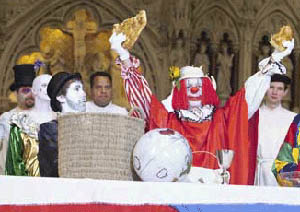"I believe that I cannot by my own reason or strength believe in Jesus Christ, my Lord, or come to Him; but that the Holy Spirit has called me by the Gospel..."
For those of you who don't know, these words commence Martin Luther's explanation of the Third Article of the Apostles' Creed in his Small Catechism. And these are words that we Lutherans hold dear. We love them. We memorize them. We quote them. We cherish them. But do we always believe them?
Certainly we believe them in an academic sense, in an official-statement-of-belief kind of way. After all, it's these plain words that hold fast to the doctrine of divine monergism that so frequently gets gobbled up by Arminian jaws before the Christian's eyes. It's these simple words that remind us that the Holy Spirit is not some insecure, fumbling ninny who can only dare to linger 50 yards away from your doorstep, hoping that, one of these days, you might finally invite Him in. We confess these words because they confess what the Scriptures teach about salvation-that the Triune God is not only solely responsible for willing and winning our salvation, but that He is also solely responsible for delivering that salvation to us through the call of His Spirit.
And yet, while we certainly believe these words, do we really believe them? Is our love of these words confined to using them as endless ammo against the endless onslaught of decision-theology marauders or do these words actually have a formative impact on how we deal with unbelief, false doctrine and error in our daily lives?
I ask this because, despite how loudly we declare that we cannot by our own reason or strength believe in Jesus Christ, our Lord, our behavior often makes it clear that, somewhere in the rotten corners of our hearts, we don't really believe this. Despite our claims to the contrary, our fruit often reveals how the old man, the hidden Pharisee within us won't give up the notion that faith is our noble accomplishment, our glorious work, our great achievement.
Because if we truly did believe these words, we simply wouldn't do the things we do. If we really believed that we could very well be communing cats and dogs if it weren’t for the call of the Holy Spirit, we wouldn’t act as though the root problem with those who practice open communion is that they’re morons and not as smart as we are. If we really believed that our desire to gobble up every word of the Lutheran Confessions comes from God and not us, we wouldn’t set up websites dedicated to smashing into pieces those who let too much dust accumulate on their copies of the Book of Concord. If we really believed that it was no one but the Holy Spirit who crushed our sinful hearts and gave us new hearts eternally united to our Savior, well, we wouldn’t think that the solution to the problem of unbelief is to rake people over the coals until they realize that we’re right.
None of this is to say that error/heresy/unbelief are not problems. They certainly are and they need to be tackled head on. The aforementioned open communion, for example, destroys a proper understanding of the Sacrament and the One who gives it. And that will eventually destroy both the congregations and church bodies that endorse it.
But tackling the problem and ripping to shreds those who perpetrate the problem are not one in the same thing. And if, as we claim to believe, the only thing that can solve these problems is the Holy Spirit working through the Word, then we ought to act like it. Instead of castigating, we ought to confess. Instead of grumbling, we ought to proclaim. Instead of sitting in our offices, sneering at those who need exactly the same thing that the Holy Spirit so freely gave us, we ought to at least go to their homes, sit down with them and declare the Truth before we shake the dust off of our feet. After all, for quite some time, the Lord kept His shoes pretty filthy for our sake.
My name is Pastor Hans Fiene. Thanks for reading.





